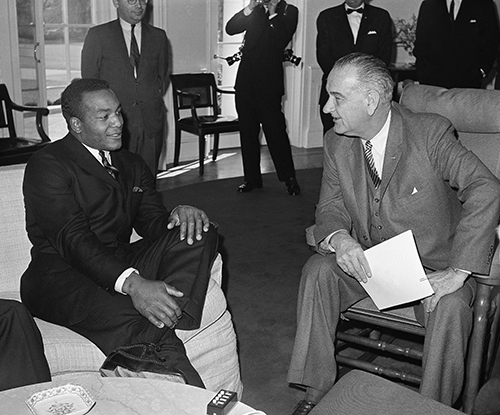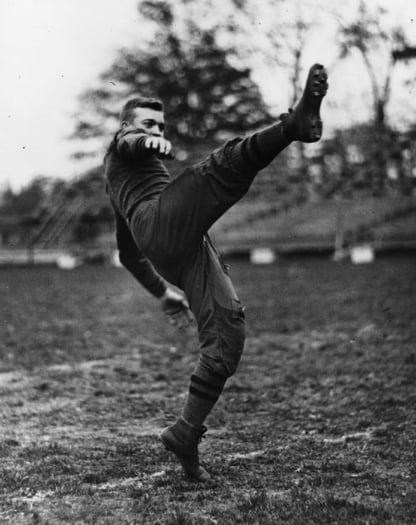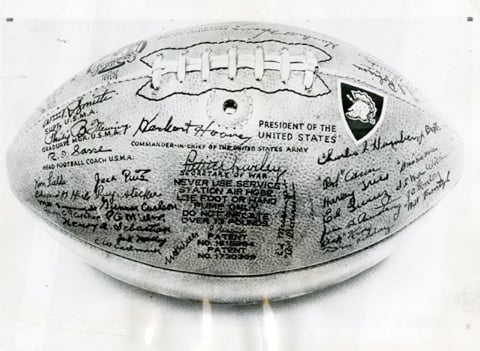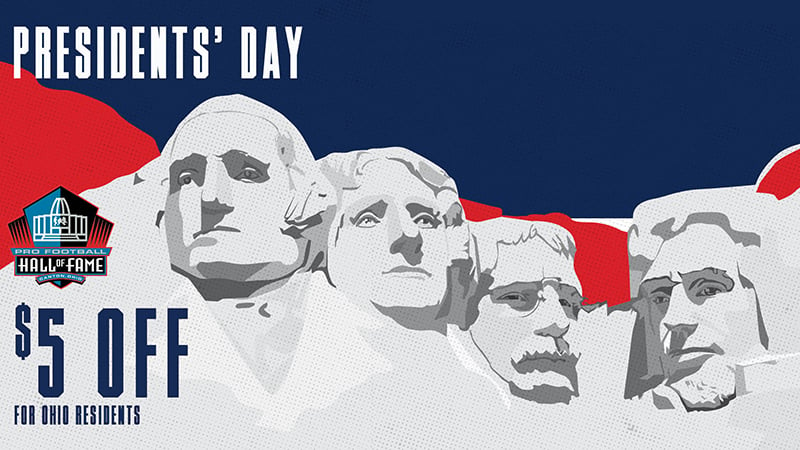XV POTUS FOOTBALL FACTOIDS - Part 2
Portions of below Courtesy guest post Susan K. Donius, Director of the Office of Presidential Libraries at the National Archives and images courtesy National Archives
NINE: President Lyndon B. Johnson (1963-1969) was President during the first Super Bowl in 1967. President Johnson did not attend what was then called the AFL-NFL World Championship Game on January 15, 1967. However, on June 7 of that same year he received a solid-gold lifetime pass to all NFL games from NFL Commissioner Pete Rozelle.
Like President Coolidge, Johnson did not play football but appreciated the traits and benefits of the game. In 1966, he was honored with the Tuss McLaughry Award, given by the American Football Coaches Association to a distinguished American for the highest distinction in service to others. Below are quotes from his acceptance speech:
“In the nearly 100 years that Americans have been enjoying this great sport, Presidents and Cabinet officers and Justices and leaders in every walk of life have first learned the lessons of discipline, of dedication, out on the athletic fields of the United States.”
“Football is really and truly an American institution. It embodies our highest ideals of character and courage. So I not only have a very healthy respect for the game and the institution, but I have respect for the men who have developed it and who have built it.”

TEN: President John F. Kennedy (1961-63) played on the junior varsity football team at Harvard. He would later quip, “Politics is an astonishing profession – it has…enabled me to go from being an obscure member of the junior varsity at Harvard to being an honorary member of the Football Hall of Fame.”
The 1961 recipient of the NFF Gold Medal, Kennedy played junior varsity football as a wide receiver at Harvard. He famously said when accepting the NFF Gold Medal, “Politics is an astonishing profession. It has permitted me to go from being an obscure lieutenant, serving under General MacArthur , to Commander-in-Chief in fourteen years, without any technical competence whatsoever. And it’s also enabled me to go from being an obscure member of the junior varsity at Harvard to being an honorary member of the Football Hall of Fame.” His quotes on the importance of football to our country include:
“I think General MacArthur really spoke about football in the classic way, because on so many occasions in war and peace I have seen so many men who participated in this sport, some celebrated and some obscure, who did demonstrate that the seeds had been well sown.”
“This is a great American game. It has given me personally some of the most pleasant moments of my life.”
“I do not suggest that physical development is the central object of life or that we should permit cultural and intellectual values to be diminished. But I do suggest that the physical health and vitality constitute an essential element of a vigorous American community.”
“Politics is like football; if you see daylight, go through the hole… “There are not so many differences between politics and football.”
“But why, some say, the moon? Why choose this as our goal? And they may well ask why climb the highest mountain? Why, 35 years ago, fly the Atlantic? Why does Rice play Texas? We choose to go to the moon. We choose to go to the moon in this decade and do the other things, not because they are easy, but because they are hard, because that goal will serve to organize and measure the best of our energies and skills, because that challenge is one that we are willing to accept, one we are unwilling to postpone, and one which we intend to win, and the others, too.”
ELEVEN: President Dwight D. Eisenhower (1953-1961) played at Army and he was injured tackling Jim Thorpe. On November 9, 1912, Dwight D. “Ike” Eisenhower was injured tackling Jim Thorpe, the legendary American Indian athlete and future first President of the National Football League. Thorpe had just won gold at the 1912 Summer Olympics in Stockholm, and Ike was a cadet at West Point. The two men faced off in a game between the Carlisle Indian Institute and the Army. Contrary to popular belief, Ike’s tackle of Thorpe did not result in the injury that ended his football career, which instead occurred in a later game against Tufts University.

He was also 1958 recipient of the NFF Gold Medal, Dwight D. Eisenhower played halfback and linebacker at the U.S. Military Academy at West Point. A knee injury ended his career in 1912, but he continued to participate in the sport as a junior varsity coach. He remained a staunch proponent of the game and the virtues it instills in the young men who play it. His quotes include:
“But I noted with real satisfaction how well ex-footballers seemed to have leadership qualifications . . . I believe that football, perhaps more than any other sport, tends to instill in men the feeling that victory comes through hard — almost slavish — work, team play, self-confidence, and an enthusiasm that amounts to dedication.”
“Morale — the will to win, the fighting heart — are the honored hallmarks of the football coach and player. Likewise, they are characteristic of the enterprising executive, the successful troop leader, the established artist and the dedicated teacher and scientist.”
TWELVE: President Herbert Hoover (1929-1933) attended the first-ever football game between Berkeley and Stanford. Hoover entered Stanford University in its inaugural year, 1891. One year later, he was present for the first “Big Game” football rivalry between the University of California at Berkeley and Stanford University.
The recipient of the 1960 NFF Gold Medal, Herbert Hoover was the manager of the football team at Stanford University, and he helped stage the first “Big Game” between Stanford and California in 1892. His quotes include:
“You have already had ample evidence before you of the enormous benefits nationally of football… It does perform a service that reaches into many phases of the life of our nation. And, I know that those reflections are upon the whole country, that is, of sportsmanship as a teacher of morals greater indeed than any other agency except religion. And of course, the sports create in the mind of the young the will to endure and the will to win, and all those are on reflections on the nation as a whole.”
“It has always been a source of great satisfaction and pleasure that I was the financial manager of the Stanford varsity football team in 1894. I was not in football long, but long enough to learn that it is a marvelous game, entertaining, recreative and educational. The qualities in which a player must perfect himself are valuable to him all through life and that is why so many old football men are conspicuous successes in life. They have been trained in the essential grooves.”
“I would like to expand my assertion that football is a great teacher of morals to the extent that it is not limited to the members of the contesting teams, but that it radiates out to huge crowds at the games – those who attend know well the rules of sportsmanship.”

THIRTEEN : President Theodore Roosevelt (1901-1909) helped to legalize the forward pass. In 1905, football was under scrutiny after 18 deaths related to the sport were reported. President Roosevelt invited college officials to the White House saying “Football is on trial. Because I believe in the game, I want to do all I can to save it.” He also recruited his famous “Rough Riders” from soldiers who had played football. He also attended the first Army Navy Game.(See itinerary below)
Despite never playing football because of bad vision, Theodore Roosevelt played critical role in the history of the sport. To make the game safer, he held a summit at the White House in 1905 that led to the neutral zone, limits on the number of players on a side, the forward pass, and the Intercollegiate Athletic Association of the United States, which would later become the NCAA. He understood that football had a role in preparing young men for the hardships in life. His football quotes include:
“In life, as in a football game, the principle to follow is: Hit the line hard. Don’t foul and don’t shirk, but hit the line hard!”
“Athletic sports are good, especially in their roughest form, because they tend to develop courage. They are good also because they encourage a true democratic spirit.”
“One of the best things about football is that it exemplifies the value of VIM. Of all the legacies left us by the Romans, there is none more important than this little word VIM. Printed in capital letters, it is a handsome word and looks the way it means – earnest, spirited energy. It ought to be carved over the doors of all buildings through which pass athletes, soldiers, sailors and all men who engage in any competition, strife or contest.”
“The credit belongs to the man who is actually in the arena, whose face is marred by dust and sweat and blood, who knows the great enthusiasms, the great devotions, and spends himself in a worthy cause; who at best if he wins, knows the thrills of high achievement and, if he fails, at least fails while daring greatly so that his place shall never be with those cold and timid souls who know neither victory nor defeat.

PRESIDENTS ‘MUST SEE’ ARMY-NAVY
This year, the 117th Army-Navy game was be played, with Army winning for the first time in 14 years. renewing the rivalry between the two service academies that started in the late 1800s. These two programs are full of tradition, and this game has several as well, including the frequent attendance of United States presidents.
XV POTUS FOOTBALL FACTOIDS - Part 1
Fun football facts about United States Presidents

